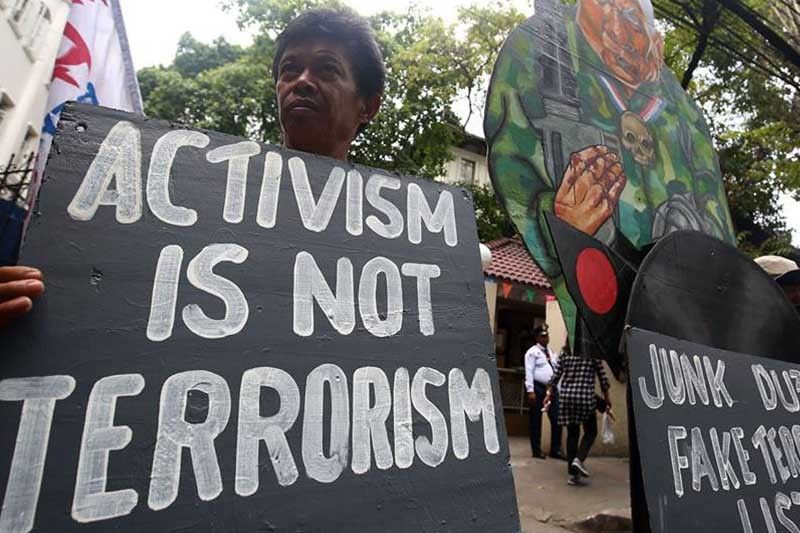Anti-terror bill would curb human rights, consolidate executive branch’s power — CHR

MANILA, Philippines — The Commission on Human Rights on Tuesday warned against the Senate’s controversial bill seeking to bolster the country’s anti-terrorism policies.
The CHR released a statement saying the Anti-Terrorism Act of 2020’s definition of terrorism “paves the road for possible abuse as it tends to blur the distinction between terroristic activities and ordinary crimes.”
CHR spokesperson Jacqueline de Guia said the bill could be “used to limit substantial freedoms, including expression of dissent and critical perspectives most especially by civil society and human rights groups, under a democracy.”
De Guia also highlighted that the new bill, which would replace the Human Security Act, would allow the prolonged detention of suspects without a judicial warrant.
"Prolonged detention under the bill—up to 14 calendar days, with the possibility of extending it to 10 more days—may result to cruel, inhuman, and degrading treatment or torture, which does not only pertain to acts of interrogation, but also conditions experienced by the suspect,” she said.
The bill also allows authorities to delay the delivery of those they arrest to the proper judicial authorities. This goes against the constitutional guarantee of due process.
De Guia added that the bill broadens the power of the executive branch to a degree that threatens the check-and-balance mechanism which is meant to prevent abuse.
On Tuesday evening, the House of Represenatives approved on second reading the proposed Anti-Terrorism Act. This was the same version that the Senate approved on third and final reading last February.
Malacañang on Tuesday defended President Rodrigo Duterte's call to the House of Representatives to fast-track the passage of the bill.
The Senate version approved back in February was met with criticism from local and international rights groups over provisions said to loosely define terrorism and authorize the widescale violation of human rights in the Philippines.
Presidential spokesperson Harry Roque claimed the country’s anti-terrorism laws were due an upgrade, calling them the “loosest in the world.” He made this claim despite saying in 2007 that the Human Security Act "would legitimize the role of the Philippine president as chief executioner.”
President Rodrigo Duterte signed the Anti-Terrorism Law on July 3 despite opposition from rights groups and civil society groups that it could be used to stifle human rights.
A petition against the law has been filed at the Supreme Court and other groups are preparing pleadings of their own.
Follow this page for updates. Photo courtesy of The STAR/Michael Varcas
National Security Adviser Hermogenes Esperon moves to block access to several websites, including news sites of alternative news orrganizations Bulatlat.com and Pinoyweekly.org.
In his letter to the National Telecommunications Commission, he only says the websites are "affiliated to and are supporting these terrorists and terrorist organizations."
No other basis to back up his allegation was cited in the letter.
Citing the designation of the CPP-NPA-NDF as terrorists, NSA Hermogenes Esperon moves to block access to several sites.
— Kristine Patag (@kristinepatag) June 22, 2022
In Esperon's letter to the NTC, he included news sites @bulatlat and @pinoyweekly; sites of other progressive groups RMP and Save our Schools. @PhilstarNews pic.twitter.com/nAzMITJFsS
The Commission on Human Rights says it "partly welcomes" the Supreme Court decision that some parts of the controversial Anti-terrorism Law are unconstitutional.
CHR spokesperson Jacqueline de Guia says the commission remains hopeful that the remaining contentious provisions of the law will be clarified by the high cour in the full text of the decision.
"At the same time, our commitment remains in guarding against possible human rights violations arising from the implementation of the anti-terror law. We steadfastly remind the government that countering terrorism and protecting human rights are not competing values but are, in fact, mutual and complementary," De Guia says in a statement.
The Supreme Court has deliberated and voted on the controversial Anti-Terrorism Act but the decision will be released "at the soonest time possible."
"However, considering that there were numerous issues resolved in the case, as well as the fact that each Justice had to vote on each issue, there is a need to accurately confirm and tally the vote of each Justice in order to ensure the correct resolution of the Court per issue," SC spokesperson Brian Hosaka says.
The Anti-Terrorism Council designates the National Democratic Front of the Philippines, the panel that negotiates for communist rebels during peace talks a terrorist organization.
Previous designation of the Communist Party of the Philippines and New People's Army led to the designation of supposed members of the CPP's Central Committee. Among those designated as terorrists were peace consultants.
Designation gives the Anti-Terrorism Council the authority to investigate and freeze the accounts of designated persons.
The Anti-Terrorism Council has designated 29 people, including alleged members of the Communist Party of the Philippines-New People's Army, as terrorists in two resolutions.
Designation allows the Anti-Money Laundering Council to freeze the assets of those on the list.
- Latest
- Trending

































